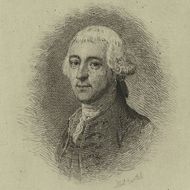Pierce Butler (Founding Father)
| Founding Fathers | |
|---|---|

| |
| Pierce Butler (Founding Father) | |
| State | South Carolina |
| Religion | Episcopalian |
| Founding Documents | United States Constitution |
Pierce Butler (July 11, 1744 - February 15, 1822) was a delegate to the Constitutional Convention, representing the state of South Carolina.[1]
Contents
Early Life and Family
PIERCE BUTLER was born in Ireland on July 11, 1744, was the third son of Sir Richard Butler, fifth baronet, and member of Parliament for Carlow, 1729-61. He was entered in the army at a very early age, and, owing to his father’s wealth and influence, held a commission, dated February 15, 1755, as lieutenant in the Twenty-second Foot before he was eleven years of age. In 1760 he became lieutenant, and in 1761 captain, in the same regiment. In July, 1762, he exchanged into the Twenty-ninth Foot, of which he became major on April 20, 1766. He was for some years stationed in America, but sold his commission in 1773 in South Carolina, where he had married, in 1768, a daughter of Colonel Middleton.[2]
Career
After the Revolution he took an active part in local politics; and on March 6, 1787, he was appointed a delegate to the Continental Congress from South Carolina, but did not take his seat until August 2, having been in the mean time chosen one of the representatives of his State in the Federal Convention, in whose debates he took an active part. He started out as a member of the Federalist party, but later switched over to Republican.[3]
Constitutional Convention
He proposed a rule to provide against absence from the Convention and an improper publication of its proceedings. He objected to a reduction of the powers of the States, but approved of the distribution of the powers of the government as stated in the Virginia plan. Bancroft says that Butler "advanced the business of the day by saying, in the spirit of Montesquieu, 'Heretofore I have opposed the grant of new powers to Congress, because they would all be vested in one body; the distribution of the powers among different bodies will induce me to go great lengths in its support.'" He opposed a triple executive, and favored a single one, the power of making war to be vested in the President, with power also to suspend laws for a limited time, but without an absolute negative in matters of legislation.
He urged a settlement of the ratio of representation in the Senate before deciding upon that of the House; objected to compensation of senators, and, as property was the true basis of representation, contended that the States be represented in the Senate and in the House according to wealth or contribution. He thought that blacks and whites should be equally included in fixing the proportion of representation. He opposed the election of representatives by the people, and thought that members of Congress should be paid by the States. He opposed the power of Congress to tax exports, to emit bills of credit, or to negative State laws. He proposed that fugitive slaves should be given up; that the seat of government should be fixed by the Constitution, and that a ratification of the instrument by nine States should be sufficient.
Other members of the South Carolina delegation to the Convention were Charles Pinckney, John Rutledge, and Charles Cotesworth Pinckney.
Senate
In 1789 he was elected one of the first United States senators from South Carolina. and served until 1796, when he resigned. He was re-elected in 1802, and again resigned in I804. Butler was an active member of the Senate, generally in opposition to Washington’s administration. He was one of the ten Democrats who voted in favor of Jay's treaty. He was at times a director of the first and second Banks of the United States.
Passing
He died in Philadelphia, February 15, 1822, and was buried in the family vault at Christ Church.
Legacy
Butler was one of the primary promoters of an Electoral College, which he believed would protect against corruption and foreign intrigue.[4]
Quotes
- I am free to acknowledge that His Powers are full great, and greater than I was disposed to make them. Nor, Entre Nous, do I believe they would have been so great had not many of the members cast their eyes towards General Washington as President; and shaped their Ideas of the Powers to be given to a President, by their opinions of his Virtue.[5]
- The two great evils to be avoided are cabal at home, and influence from abroad. It will be difficult to avoid either if the Election be made by the National Legislature. On the other hand: The Government should not be made so complex and unwieldy as to disgust the States. This would be the case, if the election should be referred to the people. [He] liked best an election by Electors chosen by the Legislatures of the States.[6]
See also
References
- ↑ A Biography of Pierce Butler 1744-1822
- ↑ History of the Celebration of the One Hundredth Anniversary of the Promulgation of the Constitution of the United States, Constitutional Centennial Commission
- ↑ The Age of Federalism: The Early American Republic, 1788-1800
- ↑ The Letters of Pierce Butler, 1790-1794: Nation Building and Enterprise in the New American Republic
- ↑ Pierce Butler to Weedon Butler (March 5, 1788)
- ↑ Madison Debates - July 25, 1787
| |||||||||||||||||||||||||||||||||||||||||||||||||||
